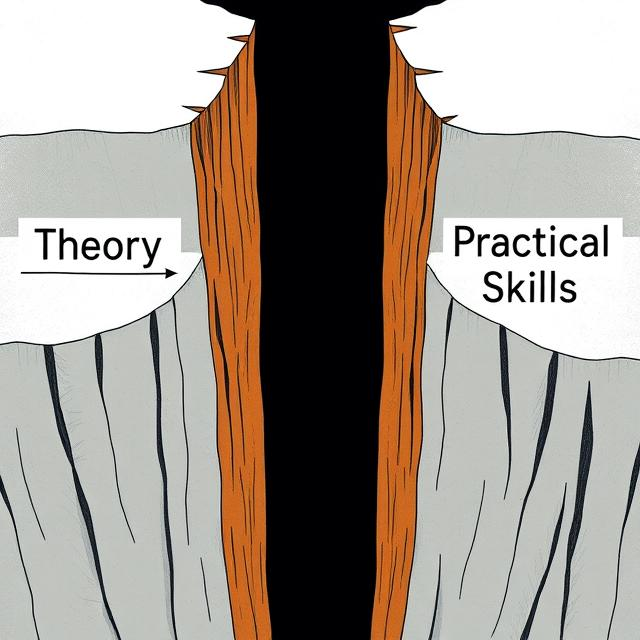Today, I will share 10 tips to help you set yourself apart and succeed in a competitive environment. These tips are based on years of observation, personal experience, and feedback from professionals in various industries.
Background: I was thrilled when MIT (Maharashtra Institute of Technology) Pune, my alma mater, invited me to give a webinar to young diploma students, who were studying IT and engineering. It was a wonderful opportunity to reflect on my own journey, from my early years of learning to the experiences and insights I’ve gathered along the way. I used this opportunity to share 10 valuable tips that I hope will help these students in their own academic and professional paths. By reflecting on my growth and offering these lessons, I aimed to inspire and support the next generation in their pursuit of success. These tips are valuable if you intend to work with foreigners or move to another country for study or business later on.
The Indian education system has traditionally been characterized by a strong focus on theoretical knowledge and a lack of emphasis on creativity and imagination. Students are often encouraged to prioritize memorization over critical thinking, and education is largely geared toward performing well in exams rather than fostering lifelong learning. This approach, deeply rooted in a system that values textbooks as the ultimate source of knowledge, can stifle innovation and limit the development of independent thought. Rote learning, or the practice of memorizing facts and figures without necessarily understanding the underlying concepts, is a key feature of this system. The education process becomes more about replication than original thinking, with students expected to reproduce information exactly as it appears in books. This can create a rigid, exam-centric learning environment, where the goal is to pass tests rather than apply knowledge in practical, real-world situations. As a result, students may excel in theoretical exams but may not be well-equipped for problem-solving or creative pursuits outside the academic sphere.
After graduating from the Indian education system and moving to the USA for my master’s degree, I immediately faced a lack of confidence. This stemmed from missing critical training and experience in basic but essential skills, such as how to present ideas clearly and effectively and how to express my opinions in academic and professional settings. The Indian system, which emphasized rote learning and theoretical knowledge, had not adequately prepared me for the practical aspects of communication and critical thinking that were expected in the American education environment. As a result, I initially struggled to adapt and lacked the confidence to fully engage in discussions and presentations.
However, I have fond memories of my time pursuing a Bachelor of Mechanical Engineering at MIT, Pune. The campus, surrounded by beautiful hills on three sides, provided a serene environment that made the four years there truly special. The education I received was invaluable, offering me a strong technical foundation that proved beneficial later in my career. Once I was able to complement this technical knowledge with the social skills I developed over time, I found myself thriving, both personally and professionally. MIT, Pune, truly shaped my academic and professional journey.
A recent study highlighted by Hindustan Times paints a stark picture of the Indian education system’s impact on employability among recent graduates. The article is titled: With degrees but no skills: Youths question country’s faulty education system (https://www.hindustantimes.com/education/with-degrees-but-no-skills-youths-question-country-s-faulty-education-system/story-gbDuzqTSVoWv5jRJeNVqcN.html). As per this article, many young professionals in India feel inadequately prepared for their first few years of employment. A major finding was that 86% of graduates reported insufficient industry linkages during their studies, which left them without the practical experience necessary for thriving in the workplace. In addition, 79% cited a lack of effective career counselling at universities, which hampered their ability to navigate career paths after graduation. The issue extends to outdated curricula, with 74% of respondents expressing concern that the syllabus in many universities does not keep pace with the needs of modern industries. These shortcomings lead to graduates who might possess theoretical knowledge but lack the hands-on skills required in today’s job market, particularly in rapidly evolving sectors such as digital media, e-commerce, and startups. The traditional focus on rote memorization further exacerbates the gap, making innovation and critical thinking difficult for many young professionals to develop during their academic years. Some graduates have managed to bridge these gaps by relying on personal initiatives to upskill and enhance their employability. However, the survey underscores the urgent need for systemic reforms, such as building stronger ties between academia and industry, updating curricula regularly, and offering comprehensive career guidance, all of which are crucial to enhancing the employability of future graduates
For new graduates, the findings of the Hindustan Times study are alarming. The gap between academic learning and the demands of the real world is widening, and companies are increasingly raising concerns that the theoretical knowledge many graduates possess is not translating into practical, job-ready skills. Employers now seek graduates who are equipped to hit the ground running from day one. This shift is largely because businesses, particularly in fast-paced industries, no longer have the time or resources to provide extensive on-the-job training. Previously, companies were more willing to invest in training programs to upskill new hires, expecting that fresh graduates would need some time to acclimate to their roles. However, with the speed of modern business and growing competition, employers are now focusing on hiring candidates who can contribute immediately. They want graduates who already possess the technical skills, critical thinking abilities, and industry knowledge needed to tackle real-time work challenges. As a result, the responsibility of being “job-ready” is increasingly falling on universities and students themselves. This shift pressures educational institutions to develop curricula that emphasize practical, hands-on learning and provide students with relevant industry exposure before they graduate.
For recent graduates, this means they must seek opportunities to build skills outside the classroom, whether through internships, freelance work, or personal projects. While this places additional responsibility on students, it also highlights the need for significant reform in the Indian education system to better align academic programs with industry expectations
In today’s competitive job market, setting yourself apart as a graduate is essential. With millions of graduates entering the workforce each year, possessing a degree alone is no longer enough to stand out. While theoretical knowledge forms a solid foundation, companies now look for candidates who also bring soft skills to the table—abilities like communication, teamwork, adaptability, and problem-solving. These are the traits that allow employees to work effectively in teams, navigate challenges, and contribute to a positive work culture, making them crucial for long-term success in any job.
However, soft skills cannot be developed overnight. Unlike technical skills, which may be taught in a structured classroom environment, soft skills require consistent practice and real-world application. They need to be nurtured over time through experiences such as group projects, internships, leadership roles, and even social interactions. For instance, learning how to present your ideas, negotiate with team members, or navigate workplace conflicts takes continuous effort and self-reflection. By developing these soft skills, you not only enhance your employability but also prepare yourself to thrive in dynamic work environments. Employers seek candidates who can not only perform their duties but also contribute positively to the company culture, lead teams, and handle interpersonal dynamics effectively. The earlier you start incorporating these skills into your daily life, the more prepared you’ll be when you enter the workforce.
The concerns expressed by top industrialists regarding Indian graduates’ readiness for the real world reflect a widespread issue in the transition from education to employment. Many Indian engineering graduates find it challenging to adapt from a theoretical academic environment to the practical demands of the workplace. This disconnect arises, in part, from how projects and internships are often approached during the final years of study. During my own final-year project, there was little opportunity to gain hands-on experience. Instead of actively participating, students often observe tasks in production companies, where workers perform the actual work. This lack of direct involvement in projects limits students’ ability to understand and apply what they’ve learned in a meaningful, practical way. In contrast, in other countries, individuals are encouraged to engage in hands-on work from an early age. They take on tasks like painting, carpentry, or even building homes themselves, fostering a culture where practical skills are valued and learned through doing. This cultural difference is illustrated by examples like the Dutch Prime Minister commuting by bicycle, which symbolizes a mindset where everyone participates in daily tasks, no matter their position. Real-world experience, like these examples, develops problem-solving skills, independence, and a practical understanding of how things work, skills that are crucial for engineers and professionals in any field.

Nothing can truly substitute for this hands-on, real-world experience. It helps build confidence, critical thinking, and adaptability—qualities that are often missing in graduates who have primarily relied on theoretical learning. If the Indian education system can shift towards a more experiential learning model, students would be better prepared to transition into the workforce, equipped with both technical skills and the ability to apply them effectively. To truly thrive in today’s competitive environment, it’s essential to broaden our horizons and avoid taking shortcuts. While quick fixes may provide temporary solutions, sustainable success comes from continuous learning and development. In an era where industries are evolving rapidly, professionals who rely solely on theoretical knowledge without putting in the effort to build real-world experience will quickly find themselves outpaced by those who have done the hard work.
If we don’t take the time to develop our skills and grow, there is simply no alternative—those with more experience or practical expertise will always have the upper hand. The reality is that employers value not just academic credentials but also the ability to apply knowledge in real-world situations. They look for individuals who are adaptable, who have faced challenges, and who have learned through hands-on experience. Whether it’s through internships, side projects, or upskilling, those who are willing to step out of their comfort zone and take on real-world challenges will be better prepared for success.
In the long run, the willingness to invest in personal growth and embrace learning will differentiate you from others in the job market. It’s a mindset shift from looking for the quickest path to success to understanding that mastery takes time, effort, and experience.
10 Tips to set yourself apart
Tip 1: Say Hello – The Power of a Simple Greeting
Tip 2: Be On Time!
Tip 3: Embrace Teamwork and Learn to Receive Feedback and Criticism
Tip 4: Cultivate General Knowledge and Awareness
Tip 5: Engage in Hobbies, Sports, and Volunteering
Tip 6: Your Attitude Determines Your Success
Tip 7: Emphasize Cleanliness and Personal Grooming
Tip 8: How to Request Help Effectively
Tip 9: Engage in Small Talk and General Discussions
Tip 10: Embrace and Celebrate Your Heritage
